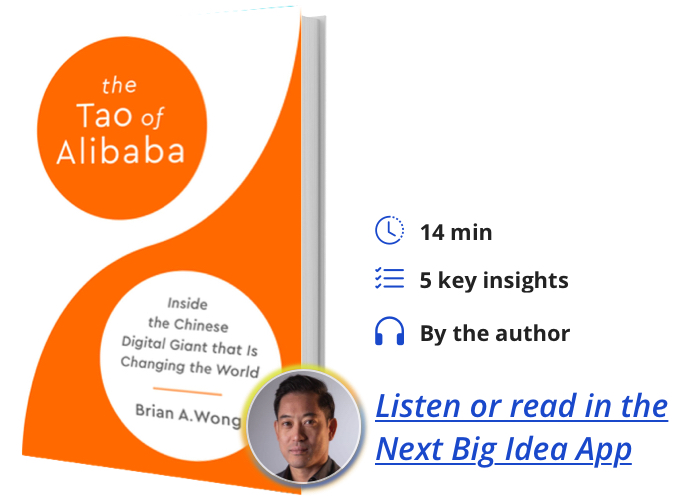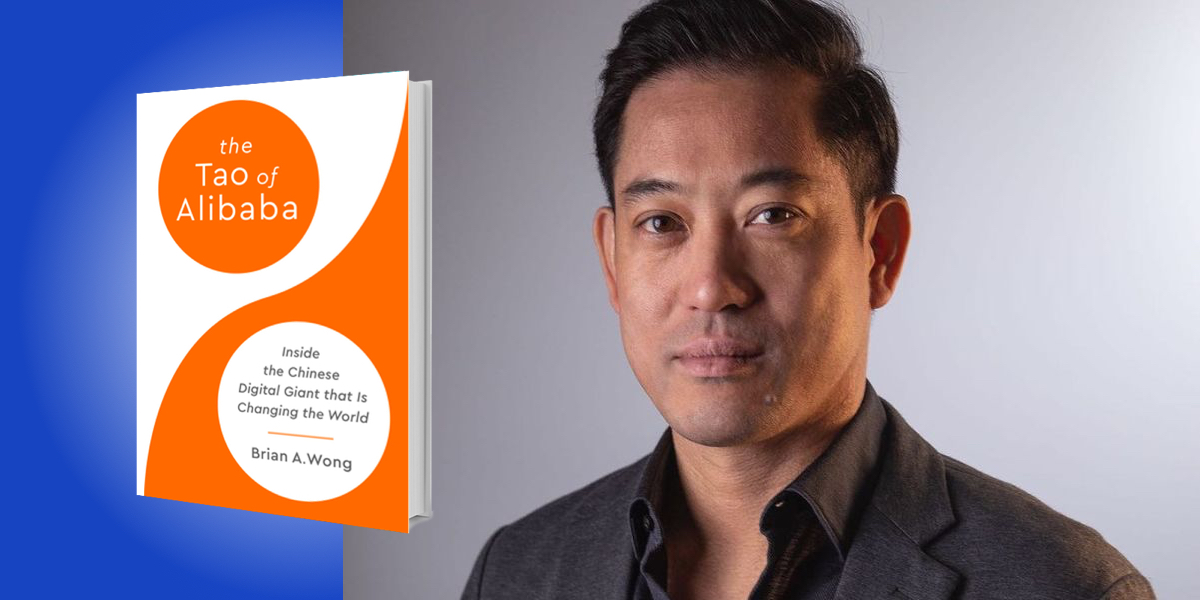Brian A. Wong is a Chinese American entrepreneur and investor. He was the first American and only the fifty-second employee to join Alibaba Group, where he contributed to the company’s early globalization efforts and served as Jack Ma’s special assistant for international affairs. During his sixteen-year tenure, Wong led the organization’s international business operations, established the Alibaba Global Initiatives (AGI) division and was the founder and executive director of the Alibaba Global Leadership Academy (AGLA).
Below, Brian shares 5 key insights from his new book, The Tao of Alibaba: Inside the Chinese Digital Giant That Is Changing the World. Listen to the audio version—read by Brian himself—in the Next Big Idea App.

1. Discover your path.
A founder establishes a company’s purpose through its mission, vision, and values. These ideas permeate an organization and become its reason for being, motivating existing employees while attracting new like-minded ones to join the cause. At Alibaba there was always something bigger than just KPIs motivating the team.
For the first few years at the company, I was skeptical of Jack Ma’s grand visions to change the way business was done in the world. But Jack’s greatest impact was in his ability to establish and communicate Alibaba’s mission in a way that not only served the company, but more importantly carried an altruistic element. Alibaba wanted to use the internet to level the playing field for small and medium sized enterprises (SMEs) and create jobs, both in China and the rest of the world.
For many of us, this was the sort of work most of us would have aspired to do outside of our day jobs. So to be part of a company trying to help those small businesses and overlooked entrepreneurs, while growing a viable business of our own, seemed like the perfect combination. Alibaba’s mission, vision, and values were something Jack constantly shared to every new employee that joined the company, and in our daily meetings to all existing employees. It was a path we all wanted to journey on together because it was meaningful and worth doing.
2. Interconnectedness brings harmony.
How does an organization fit into the existing world amidst volatile market trends, political cycles, and geopolitical shifts? How can an organization impact the larger society?
“For two decades, Alibaba’s decisions have factored in the potential impact it could have on the multiple stakeholders in society.”
Alibaba was born into the world at a certain time with certain conditions. In The Tao of Alibaba, I break down the key external factors which created an enabling environment for Alibaba’s rapid growth amidst a nascent ecommerce market. Whether it be the country’s large population, its 40 years of social stability, its investment in the physical and digital infrastructure, or the government’s light-touch policy approach, all of these factors influenced how Alibaba found its path to develop and thrive.
For two decades, Alibaba’s decisions have factored in the potential impact it could have on the multiple stakeholders in society. In 1999, in light of China’s ascension to the WTO, Alibaba.com focused on utilizing its wholesale marketplace to connect small and medium-sized manufacturers to the world’s buyers to facilitate BAW global trade. Years later, as China’s economy evolved from export-oriented into a more domestic consumption-driven one, the company’s retail marketplace, Taobao.com, introduced new opportunities for domestic consumers to discover an assortment of products never imagined. Taobao.com also hatched an entirely new digital opportunity for young people to create their own jobs rather than apply for employment at traditional companies. And Alipay transformed a low-trust, cash-based economy into a digital one through its online payment tools and, later, digital financial services.
3. Embrace contradictions.
This is the most complicated yet profound part of the Tao philosophy. It is both so simple, yet so complex. Jack often spoke in what often sounded like riddles, leaving many people on the outside perplexed. Yet it is this mindset of embracing contradictions which gives Alibaba its flexibility in how it approaches problems. Rather than just focusing on the consistency of logic, the ability to calibrate and shift between concepts in opposition opens up new possibilities and ways of thinking as the company makes decisions.
For example, in early 2000, at one of his early talks at a Harvard Business School conference, Jack said to the audience, “Alibaba is successful because we had no business plan, no money, and no technology.” At face value, this statement would sound absurd. But upon closer assessment, the essence of these words lie in the interpretation of the dichotomy of meanings.
“Alibaba is led by an Eastern philosophy but uses Western management processes and systems.”
“No business plan” implies a company must be willing to adapt its plan in accordance with a rapidly changing business environment. “No money” refers to Jack’s belief that money made people “stupid” because too often executives outsourced work to agencies or third parties which led to generic or less creative marketing. In proclaiming Alibaba had “no technology,” Jack meant his lack of technological expertise allowed engineers more room to experiment and try new things without excessive intrusion from the founder (who perhaps may have had strong opinions on which software or hardware to use). Jack approached the technology problem as an end-user and assessed only whether it was solving the perceived problem for a user, not whether the technology was the most advanced or most sophisticated.
Other examples of this unity of contradictions within Alibaba include how the company’s strategy is guided by a charitable heart yet uses business techniques for execution. Alibaba is led by an Eastern philosophy but uses Western management processes and systems. And Alibaba has become the world’s largest ecommerce ecosystem through the pursuit of serving the smallest businesses.
Perhaps the most telling contrast is reflected in the company’s sixth company value: “Live seriously, work happily.” This means only when you have thought intently about the kind of life you want can you decide what sort of job will bring you happiness and joy.
4. LQ—the most critical element of leadership.
Most people know that with a high IQ and EQ combination one has a good chance of being successful. However, it is with LQ, the Love Quotient, that you will win people’s respect.
LQ refers to the need for leaders to have compassion and empathy towards others, which in turn creates a working environment of empowering and developing staff to be their best. Jack said, “If you decide to be a leader at Alibaba, your job is to help others be successful.”
This stems from Jack’s original profession as a teacher. The same ethos of a teacher enabling his students transferred over to his leadership style at Alibaba. Moreover, as someone who had experienced great challenges as a child, facing failure numerous times with his poor academic performance, failed college entrance exams, and inability to secure a job at the local KFC, he understood the pain and suffering that comes with rejection in life. Hence, a big part of his motivation in creating Alibaba was to help the underserved and marginalized; he felt that technology could be used as a great equalizer for those who were at a disadvantage. It was this leadership style that created such unwavering loyalty at Alibaba. Here was a cause that was about more than just building a successful business—it was about changing society with compassion and care.
5. Do good for business and do good for society.
For decades, business schools would espouse Milton Friedman’s adage that the sole purpose of corporations is to maximize profits. Gordon Gecko purported the same in the movie Wall Street with the famous declaration, “Greed is good!”
“Only if your customers are successful can you build a viable business.”
But Jack Ma took a different approach when he proclaimed at the company’s first IPO event in 2007. He believed that the priority at Alibaba should be to put “customers first, employees second, and shareholders third.”
Only if your customers are successful can you build a viable business. And when your customers are satisfied, your employees will feel achievement in their work. When both customers and employees are happy, the business will thrive.
With such focus on customer needs, the Alibaba ecosystem not only became one of the largest capitalized companies on the NYSE, but also had a profound impact on lives beyond the traditional business circles.
Small and medium-sized enterprises began to thrive, becoming global and domestic champions thanks to newfound digital opportunities. Women became almost half of the business owners on Taobao’s online stores. Digital payments helped bank the under- and unbanked populations, and rural communities were catalyzed into thriving economic clusters thanks to the Taobao village phenomenon. The Alibaba story proves that one can fundamentally change society for the better while creating a thriving and highly profitable business.
To listen to the audio version read by author Brian A. Wong, download the Next Big Idea App today:































